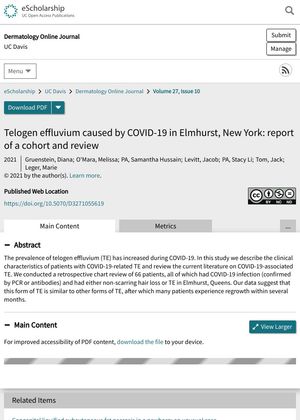Telogen Effluvium Caused by COVID-19 in Elmhurst, New York: Report of a Cohort and Review
December 2021
in “
Dermatology Online Journal
”

TLDR COVID-19 has increased hair loss, but many patients see regrowth within months.
The study "Telogen effluvium caused by COVID-19 in Elmhurst, New York: report of a cohort and review" conducted a retrospective chart review of 66 patients who had COVID-19 infection and experienced either non-scarring hair loss or Telogen effluvium (TE). The study found that the prevalence of TE has increased during the COVID-19 pandemic. The clinical characteristics of patients with COVID-19-related TE were similar to other forms of TE, with many patients experiencing hair regrowth within several months.




